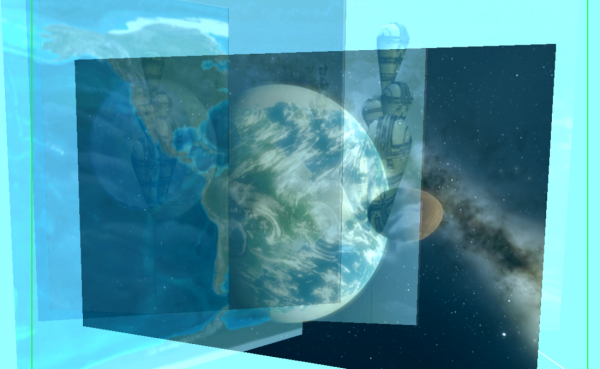BY LETTER
Trivialism
 Image from Steve Bowers |
Trivialism, or the belief that all possible statements are true, is a philosophical school of thought that, while present since the Agricultural Age, proliferated more widely between 1200 and 1400 AT. Old Earth Aristotelian philosophy considered trivialism the result of the acceptance of contradiction; the Law of Non-Contradiction — according to one reading, "the most certain of all basic principles is that contradictory propositions are not true simultaneously" — was supposedly devised to dismiss this. Between 10 AT and 230 AT (1980 and 2200 CE), philosophers of the Information and Interplanetary Ages began to re-assess trivialist thought, weighing out the ramifications of the adoption of trivialist epistemological and metaphysical frameworks. This reorientation towards trivialism was guided by developments in paraconsistent logic (considered by some modosophont scholars to be a likely precursor to some versions of translogic), as well as the reappraisal of Buddhist philosophers like Nāgārjuna and Jay Garfield.
Within the two hundred years after the first Terragen minds other than GAIA breached the Second Singularity (12th century AT), trivialist thought again became a significant topic of discussion. At this time, trivialist philosophy split into two major traditions:
Ataraxist Trivialism — Trivialists in this vein believe that the fact that everything is true is a source of comfort and inspiration during the pursuit of nirvana (or another similar transcendent goal). Generally, ataraxists use trivialist philosophical precepts to characterize and refine notions of truth as they might relate to personal and societal growth. Of particular importance at times is the notion of the 'explosion world' (stylized with an italicized e), which is the world wherein all truths co-exist simultaneously. Reflection on e with the aim of reconciling e with our world has occupied many Terragen minds for decades and even centuries. Indeed, ataraxist trivialism has heavily influenced the thought and praxis of at least 50,000 documented Buddhist, Hindu-based, and Neo-Shinto sects since 1400 AT, with most of these consciously influenced sects arising between 6500 AT and the present day. This version of trivialism can be found all over Terragen space, but has especially passionate adherents in the Sophic League, the Communion of Worlds, and the Utopia Sphere.
Spolandylial Trivialism — Named after the first toposophic 'thought gardener' Spolandyliax-Lambda, this trivialist tradition is heavily informed by the thought of 1st century AT philosophers David Lewis and Takashi Yagisawa. This tradition takes seriously the notion that the actual world ('the way the world is'), possible worlds ('the ways worlds could be'), and impossible worlds ('the ways worlds cannot be') are less metaphysically and epistemologically separated than might be initially assumed. To a spolandylial trivialist, 'It is true that peach robots eat time', 'It is true that lamps and sounds are mortal enemies', and 'It is true that every snapped copper cord has 702 inner thought dimensions' all say something important about reality — and sophonts can spend infinite lifetimes gleaning the truth within these (and all other) statements. [Note: Peaches are an Old Earth species of fruit.] This version of trivialism has been applied in a syncretist manner to Keterist, Solarist, Etodist, Undyoist, Mykulturist, Ipsemist, Fractalist, and Magusist thought, as well as to the precepts of countless other religious and philosophical schools. Aside from some vocal modosophont adherents in the Communion of Worlds, this philosophical tradition is said to be particularly popular with transapients in the Technorapture Hypernation and the Cyberian Network.
A third, and somewhat minor, trivialist tradition, the Inveterate Dazzle Crutch, arose in the 4400s AT from the belief that truth statements alone were not enough to capture the fecundity of reality. Adherents of the IDC trivialist tradition consider foundational statements outside of truth to have validity as well. To many IDC trivialists, statements beginning with 'It is green that…', 'It is cold that…', 'It is the Galbydeia-standardized 19th version of gear that…', and 'It is anti-true, but not false, that…' all say important things about reality. In fact, to the IDC trivialist, any statement with an 'It is… that' structure has meaning relevant to reality. IDC trivialism waxes and wanes in popularity in its birthplace, the Mutual Progress Association, where some of its more supposedly outré 'visions' have informed both MPA materialist thought and architecture. It is also considered fondly in the Fomalhaut Acquisition Society. Other polities — like the Negentropic cultural sphere, for example — deem IDC trivialism 'wasteful' or even 'nonsensical'. Curiously, there are indications that the 'original culture' that the Silent Ones claim was levied upon them may have similarities to some IDC trivialist ways of life. Modosophont scholars continue to argue over whether these IDC trivialist 'visions' continue to subtly inform the current Silent One culture / way of life.
Related Articles
Appears in Topics
Development Notes
Text by FrogWorld5
Initially published on 29 January 2019.
Initially published on 29 January 2019.






